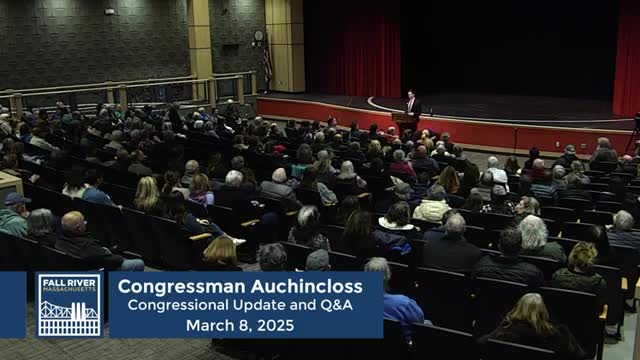Auchincloss outlines constituent services, housing and drug priorities at Fall River town hall
Get AI-powered insights, summaries, and transcripts
Subscribe
Summary
U.S. Rep. Jake Auchincloss told a packed Fall River town hall he is prioritizing local constituent services, waterfront and manufacturing grants, housing supply measures and bipartisan fentanyl interdiction while answering questions on Social Security office closures, Medicaid and community health center funding.
U.S. Rep. Jake Auchincloss, D-Mass., used a Saturday town-hall in Fall River to review his recent work in Washington and take questions from local residents on housing, health care, immigration and opioids.
Auchincloss began by stressing constituent services and local federal investments, saying his office has helped residents with Social Security and Medicare issues and that he is "fighting to keep the Social Security office here in Fall River open." He described work to secure federal funding for waterfront redevelopment and to restart a frozen National Institutes of Health grant for a local manufacturer producing personal protective equipment.
The congressman framed housing as the district’s most urgent economic challenge and outlined two federal levers he supports: expanding the Low-Income Housing Tax Credit and offering lower-cost capital loans to developers. "If you want the price to go down, you've got to increase supply," Auchincloss said, adding that permitted projects often stall because of the cost of capital, not zoning alone.
On opioids, he said he has led bipartisan legislation aimed at stopping fentanyl at its source in mainland China and would push for sanctions on manufacturers and stricter checks of ship manifests. He described proposed measures to levy fines on ships without clear manifests and to form a joint counter-opioid task force in the executive branch. Locally, he highlighted federal funding that supports Fall River’s FAST team and said combining law enforcement with public-health workers is an effective frontline approach.
The congressman criticized pharmacy benefit managers (PBMs) and large health insurers for driving up prescription costs and said bipartisan efforts to regulate PBMs nearly passed in December. He also described efforts to make a new non-opioid acute pain medication more affordable by lowering patient copays relative to opioids.
Asked about immigration and border security, Auchincloss reiterated support for bipartisan immigration bills he helped cosponsor and said Congress has a role in preventing large migratory flows that strain state and local housing. On executive power, he warned against unilateral use of emergency spending and invoked the "impoundment" issue, saying Congress must preserve its Article I spending authority.
Several residents raised local concerns: the possible closure of Fall River’s Social Security office, community health center funding that expires at month’s end, homelessness numbers that a local count put at "over 300," and the collapse of Steward Healthcare. The mayor and local officials said federal SAMHSA funding (a multi-year grant exceeding $2 million) supports the city’s FAST team and homeless services.
Auchincloss repeatedly described his approach as bipartisan and local-focused: "We're your front door to Washington, D.C., which can be a complicated place," he said. He also urged civic engagement and participation, noting his staff will remain available to take constituent requests after the event.
The town hall featured a large turnout and a wide-ranging Q&A with state and local officials present, but it produced no formal votes or binding actions. Residents and local leaders asked for continued congressional support on the Social Security office, community health center funding, affordable housing finance, and oversight related to Steward Healthcare and opioid trafficking.
